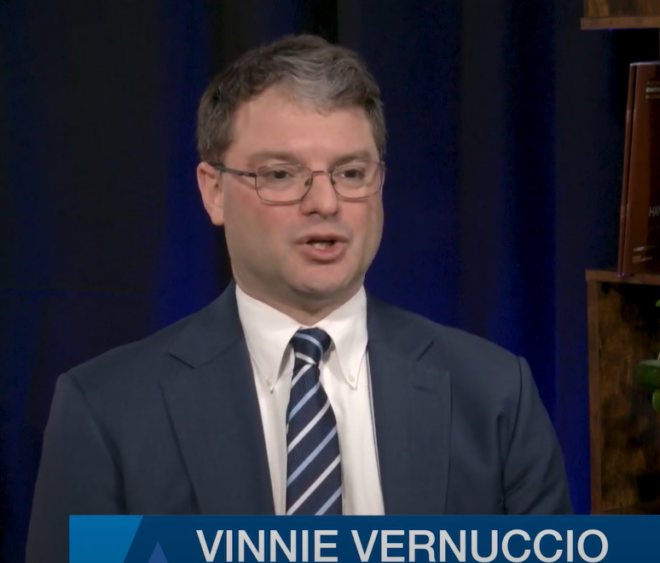Posts tagged private-sector workers

Education and Workforce Committee Passes 3 Bills to Expand Flexibility, Boost Earnings, and Hasten Back Pay
November 25, 2025 // On Thursday, the House Education and Workforce Committee passed three bills to boost flexibility, wages, and efficiency for workers. These three bills would modernize the 1938 Fair Labor Standards Act to provide flexibility for workers, simplicity for tipped employees, and more efficient resolutions to payroll errors. Importantly, none of these provisions will cost taxpayers a single dime because they simply remove unnecessary barriers to flexibility and higher pay. In fact, at least one of the bills would likely save taxpayers from unnecessary administrative costs.

Newt’s World Episode 899: Employee Rights Act
October 13, 2025 // Newt talks with Vincent Vernuccio, President of the Institute for the American Worker about the Employee Rights Act of 2025, a legislative proposal aimed at enhancing and safeguarding the rights of American workers while promoting fairness and accountability in the workplace. Introduced by Senator Tim Scott and Congressman Rick Allen, the bill represents a Republican vision for the workforce, focusing on empowering workers, improving unions, and fostering innovation and growth. Vernuccio highlights the outdated nature of current labor laws,
Op-ed: Celebrating the Decline of Big Labor
September 2, 2025 // New York and California have 17 percent of U.S. workers, but almost 30 percent of U.S. union members. The states with the lowest rates include the Carolinas, which do not allow collective bargaining in the public sector. More states should look to abolish public-sector collective bargaining, as Utah did this year. And more states should pick up where Republicans left off in the early-to-mid 2010s by passing right-to-work laws. The first order of business should be restoring Michigan’s law that Democrats repealed. In 24 states, private-sector workers can still be coerced to join or financially support a union.

The Roadmap To Modernizing Federal Labor Laws: Matt Kittle, F. Vincent Vernuccio
July 20, 2025 // That's one of the main things that we want to see at I4AW. Is workers having a choice in a voice, having. The ability to say who they want to be represented by, how they want their money spent, and how they want to work. And I know we talked about it briefly with the ERA, but the ability for an independent contractor to work for themselves, not be considered an employee, small business owner, to own a franchise, all those things are core to what the flexibility and the entrepreneurship of the modern worker, and those are the concepts that are embraced, you know, not just on the union end of the Employee Rights Act, but on the innovation and entrepreneurial spirit and pro worker end of the ERA.

Democracy in the Workplace Is Under Threat
June 30, 2025 // The National Labor Relations Board, which the NLRA created, initially agreed with the majority-of-a-unit standard. In a 1936 decision involving Chrysler, the board rejected a unionization election in which only 125 out of an eligible 700 workers had voted. While 97 percent of the voting workers supported organizing, the board rightly concluded that a mere 17 percent of workers didn’t represent the views of the majority. The law’s text required that ruling. But the NLRB reversed course within months, giving a minority of workers the power to determine the majority’s future in a case involving newspaper workers. In a separate decision, the board declared that it couldn’t require a majority of workers to vote in favor of unionization, nor could it require the lower bar of a quorum. The NLRB, in the 1930s, defended its rejection of the law’s plain text by saying that, with a majority requirement, “the purpose of the [NLRA] would be thwarted.” But the board itself is doing the thwarting of workers’ rights and workplace democracy.
Op-Ed: Public employees deserve truth from union officials
June 24, 2025 // Pueblo’s contract isn’t even the worst offender in Colorado. The Denver Housing Authority’s contract, enacted this year, says that its 300-plus employees must be full, dues-paying members of the union, AFSCME Local 535. If enforced, the requirement could be one of the most egregious violations of public employees’ rights of free speech and association anywhere in the country. With some union officials unaware of — or unwilling to comply with — dettled law, it’s more important than ever for public employees in the state to understand their rights under union representation.
Op-ed: Colorado workers should know their rights
May 22, 2025 // With the examples of Pueblo and Denver—and those in other states—in mind, Colorado employees would be wise to educate themselves on their rights under state and federal law regarding union membership and representation. With lawmakers determined to expand union power, it may be up to employees to ensure that union officials are also held accountable to the law.
US Supreme Court clears way for Trump to remove two Democratic members of labor boards for now
April 10, 2025 // Trump's efforts to remove Harris have threatened to leave the board without a two-seat quorum - making it unable to decide cases - after the term of Democratic member Raymond Limon expired on February 28. In ruling in favor of Harris, Contreras said the statutory protections for board members from being removed without cause conform with the Constitution in light of a 1935 Supreme Court precedent in a case called Humphrey's Executor v. United States. In that case, the court ruled that a president lacks unfettered power to remove commissioners of the U.S. Federal Trade Commission, faulting then-President Franklin Roosevelt's firing of an FTC commissioner for policy differences.
Commentary: Is bill a state-led worker’s board, or a gift to SEIU?
April 7, 2025 // A secret ballot election for unionization requires a certain percentage of the bargaining unit to sign so-called “showing of interest” cards. When an organization allegedly has resorted to forgery is tasked with gathering and submitting these cards, it calls the integrity of the process into question. SB 1138 and HB 3838 present themselves as measures to improve workforce standards for care providers, but they have but one purpose — growing SEIU 503’s membership and influence. By embedding the union into training programs, handing it access to personal contact information and placing itself in workforce oversight, SEIU is positioned to grow its ranks at the expense of worker autonomy.
Free the Economy podcast with Vinnie Vernuccio of the Institute for the American Worker
March 27, 2025 // Our interview for Episode 116 of the Free the Economy podcast is with Vinnie Vernuccio of the Institute for the American Worker. We talk about labor unions, independent contractors, right-to-work laws, port automation, and the future of the American workforce. Free the Economy is hosted by Richard Morrison. Our co-producer and editor is Destry Edwards. Keep up with new episodes by following us on Twitter at @freethe_economy and read our episode summaries, with links to the stories we cover, at cei.org/blog.
